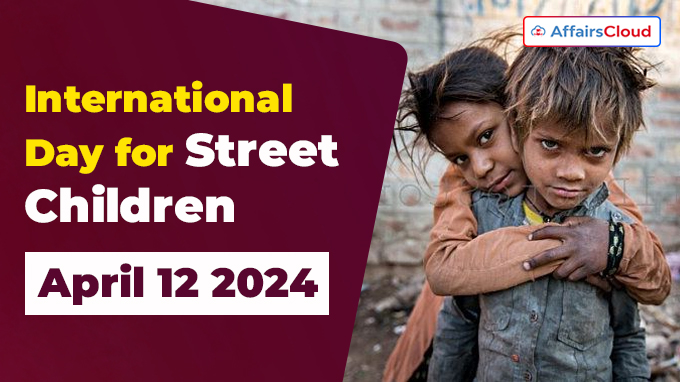 The International Day for Street Children (IDSC) is annually observed across the globe on 12 April to raise awareness about the challenges faced by millions of children living on the streets worldwide.
The International Day for Street Children (IDSC) is annually observed across the globe on 12 April to raise awareness about the challenges faced by millions of children living on the streets worldwide.
- The observance of IDSC is led by the Consortium for Street Children (CSC). Each year the CSC decides on a theme for IDSC to promote the needs of street children globally.
Note: CSC is the only global network that raises the voices of street children and creates long-term change to ensure they are not overlooked.
Theme:
The theme of International Day for Street Children 2024 is, “Belonging.”
- The 2024 theme centers on fostering a sense of belonging for street-connected children within their communities, countries, and cultures.
- It emphasises the responsibility of governments and communities to safeguard the rights of these children in both policy and practice.
Significance:
i.IDSC provides an opportunity to amplify the voices of street-connected children and their champions, ensuring their rights and well-being are protected.
ii.IDSC commemorates the strength and resilience of millions of street-connected children globally.
Background:
i.The 1st-ever International Day for Street Children was launched by CSC on 12th April 2011.
ii.Since 2012, the Day has been celebrated globally to acknowledge the humanity, dignity, and defiance exhibited by street children in the face of trouble.
Convention on the Rights of the Child (CRC):
i.In 1989, world leaders made a historic commitment to the world’s children by adopting the United Nations Convention on the Rights of the Child (UNCRC), an international agreement on childhood.
ii.Entered into force on 2 September 1990, the Convention defines everyone under the age of 18 as a child.
iii.It became the most widely ratified human rights treaty in history and has helped transform the lives of children around the world.
iv.It explains who children are, all their rights, and the responsibilities of governments.
Campaign for Equality:
i.Since 2018, CSC’s global advocacy campaign, known as “The 4 Steps to Equality”, has provided a framework for governments to ensure that street children can access all their rights under the CRC.
ii.The 4 Steps to Equality urges governments to implement the UN General Comment No. 21 on Children in Street Situations fully, ensuring equality and protection for street-connected children.
iii.The 4 Steps to Equality are:
- Commit to Equality
- Protect Every Child
- Provide Access to Services
- Create Specialised Solutions




